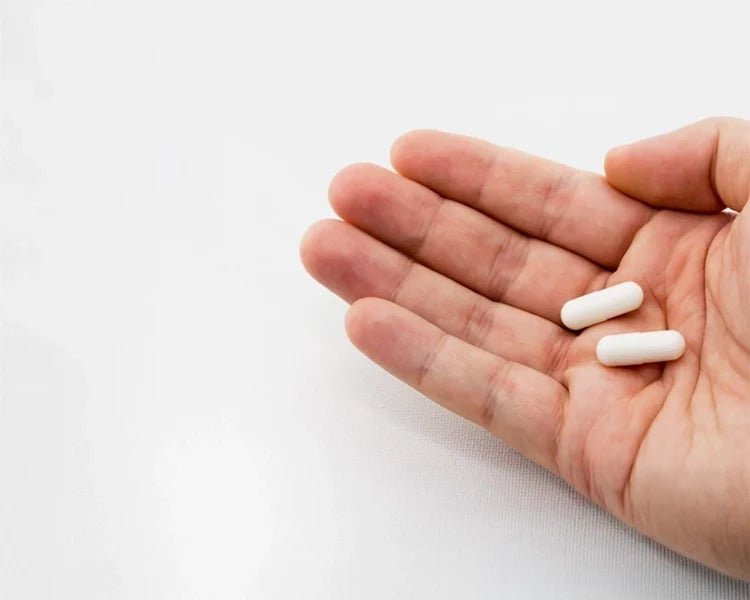Education
Medicine or dietary supplement? What to choose?
Mr. Magister, I would like some magnesium "in the form of a MEDICINE". A conversation at the pharmacy window often begins with this phrase. Then the patient begins a long analysis of the composition and packaging to be 100% sure that there is no inscription "dietary supplement" on it. The pharmacist often avoids talking about this topic, but should still be prepared to talk to the patient. The problem of distinguishing and comparing drugs and dietary supplements is quite difficult. Both product categories are placed on adjacent stands and have similar, and often the same, composition. So what is the mystery and why do patients try so hard to buy a drug and not a dietary supplement? Let's start with individual definitions. A medicinal product is a substance or mixture of substances presented as having properties for the prevention or treatment of diseases occurring in humans or animals or administered for the purpose of making a diagnosis or for the purpose of restoring, improving or modifying the physiological functions of the body through pharmacological, immunological or metabolic action. (Pharmaceutical Law of September 6, 2001, Chapter 1 Art.2 Point 32.) The definition contained in the Act clearly states that a drug (medicinal product) prevents, cures, improves or modifies the physiological functions of the body. Whereas: Dietary supplement - a food intended to supplement a normal diet, being a concentrated source of vitamins or minerals or other substances having a nutritional or other physiological effect, single or combined, placed on the market in a form enabling dosing, in the form of: capsules, tablets, dragees and in other similar forms, sachets with powder, ampoules with liquid, dropper bottles and other similar forms of liquids and powders intended for consumption in small, measured unit quantities, excluding products having the properties of a medicinal product within the meaning of the provisions of pharmaceutical law. (UST AWA of August 25, 2006 on food and nutrition safety, SECTION I, Art. 3 point 3, ppk39) According to this definition, a dietary supplement is a food that is intended to supplement the normal diet with vitamins, minerals and "other" substances. At first glance you can see the difference, but is it really? Looking at the last part of the definition: excluding products with the properties of a medicinal product within the meaning of pharmaceutical law, we reach the point where it is impossible to distinguish a dietary supplement from a drug. What is the difference between a medicinal product containing 2000 IU of vitamin D3 in the form of cholecalciferol and a dietary supplement containing exactly the same in the same form, but in capsules? There are several differences between a drug and a dietary supplement, but neither side achieves a clear competitive advantage. The first issue concerns legal aspects. Various institutions register both product groups. Drug registration is handled by URL (Drug Registration Office). It does this on the basis of many tests and certificates. However, the Chief Pharmaceutical Inspector is responsible for marketing authorization in the country. Dietary supplements are also officially registered by the Chief Sanitary Inspector (GIS) on the basis of an application submitted by the entrepreneur. Therefore, it is not the law that supplements are not subject to control, because the GIS may refuse to register or, in case of uncertainty, may ask for an opinion from the URL. The registration procedure for dietary supplements is shorter and easier to carry out, which is why many drug manufacturers register their next products in this category. The second thing is the doses of individual ingredients. Based on the dose definitions, substances in a drug have a curative or preventive effect, while in a supplement they have a nutritional effect. No less surprising is the fact of the existence of vitamin C - a drug in doses of 200 and 500 mg in the presence of the same vitamin - a supplement in doses of 1000 and 2000 mg. Questions arise about the body's actual needs, the dose that produces a therapeutic or nutritional effect, and the dose that is too high to be safe. Another aspect concerns the origin of the ingredients contained in the products. Due to high standardization requirements and the purity of substances, synthetic substances obtained through chemical reactions are often used in medicinal products. Dietary supplements often contain ingredients of natural origin, which seems to be a healthier solution and more adapted to the living organism. They also contain plant ingredients and their extracts. Sometimes dietary supplements contain plant ingredients that are not found in our climate or in Europe, but which have a proven positive effect on health and fitness. Further differences concern promotion and advertising. No elements of the packaging, names or advertising of supplements may suggest medicinal properties. Each package must also have the description "DIETARY SUPPLEMENT". Every day we are attacked by advertisements for medicines and supplements, so much so that it is difficult to know what and whether it is worth buying to support our health. We consume large amounts of medicines and dietary supplements every day. This is due to the fact that the availability of supplements is very high, advertising in the media is intense, and society is taught to respond to changes in its health by purchasing new preparations. Supplements are used to improve the condition of hair, nails, skin, eyes, joints, etc. We supplement vitamins, minerals and herbs using multi-ingredient products. Therefore, it is important to know the exact composition of a given preparation. There is a high probability that several preparations will contain the same ingredients and by taking a whole range of products we will provide too high doses of the mentioned vitamins or minerals. It is also worth remembering that the most important source of supplementation is food, i.e. what we eat. So how should you approach the use of supplements to make it safe? Let us remember that choosing a drug as a safe form will not always meet the nutritional and health needs of the body. On the other hand, not all supplement manufacturers meet the quality standards of their products. Taking this summary into account, you should follow a few rules to achieve the appropriate nutritional effect while maintaining safety. Here are the rules worth following Let's choose high-end supplements - there are several leading companies on the market. Some of them can be found on our website. Companies with extensive experience, certified products and production standards such as GMP, ISO, etc. The most advantageous offers are provided by companies that grow medicinal herbs themselves and produce vitamin and mineral ingredients instead of mass purchases from suppliers. Let's use only those substances that we need - it's best to discuss the selection of ingredients with a specialist. Do not use supplements recommended by third parties. The appropriate selection of supplements in oncological diseases and post-oncological therapies is extremely important. Many ingredients have the ability to stimulate excessive cell growth. If possible, use single-component or multi-component preparations. We will then avoid the possibility of duplicating doses of the same substance. Let's ask a specialist when and how to take a given product. Often, the absorption of the substance and the effect of the entire preparation depend on the time of day or the meal we take. In light of these assumptions, I believe that the use of dietary supplements can be safe and bring good results. By choosing only medicinal products, we will not achieve long-term effects and visible results. A well-balanced and well-thought-out combination of medicine and dietary supplement can achieve very good results. Let's take the medicines that are necessary for us, let's take the dietary supplements that we need, but let's not forget about proper nutritious food, including fruit and vegetables. Krzysztof Juszkiewicz
Learn moreWhen is it worth visiting a gastroenterologist?
Digestive health plays a key role in an individual's overall health. Our digestive system is not only responsible for the absorption of nutrients, but also plays an important role in the immune system and metabolism. However, its improper functioning can lead to a variety of health problems. Therefore, understanding the importance of digestive health and being aware of signals that may indicate the need to consult a gastroenterologist are extremely important for maintaining full health and well-being. Symptoms that may indicate the need to visit a gastroenterologist are usually related to gastrointestinal problems and can be diverse. Among them stand out: Abdominal pain, which may occur in various places and have a different nature (dull, stabbing, cramping). If the pain persists for a long time or occurs regularly, it may be a sign that there is a problem in the digestive system that requires evaluation by a specialist. Heartburn, i.e. burning or burning sensation in the esophagus and chest area. Its frequent occurrence may indicate gastroesophageal reflux disease, i.e. the reflux of stomach contents into the esophagus, leading to damage to the mucous membrane. Recurrent damage and inflammation predispose to cancer processes, therefore faster diagnosis and initiation of treatment are associated with a better prognosis. Bloating, nausea, vomiting, diarrhea or constipation may indicate various conditions such as irritable bowel syndrome, inflammatory bowel disease, intestinal infections or other digestive disorders. Sudden and unintentional weight loss. If you noticeably lose weight despite maintaining a normal appetite and a healthy lifestyle, this may be a reason to consult a gastroenterologist. Weight loss can be caused by various digestive disorders, such as inflammatory bowel disease, celiac disease, colon cancer or other serious disorders, but cancer can also be the cause. Changes in stool consistency may be an important signal of health problems other than cancer. If continuous diarrhea or constipation is observed, as well as changes in the color, consistency or appearance of the stool, consultation with a gastroenterologist is recommended. This may suggest not cancer but problems such as irritable bowel syndrome, Crohn's disease, ulcerative colitis or other diseases that require diagnosis in a doctor's office. Prevalence of cancer of the digestive system in the family. Separate recommendations for such patients are currently in force and are still being developed. These most often include suggestions for accelerated tests detecting early signals of these diseases and performing an extended panel of genetic tests. Therefore, the presence of cancer or autoimmune diseases in the family should prompt other relatives to take appropriate preventive measures and monitor their health. Environmental factors such as diet, lifestyle, stress factors and infections also play an important role in the occurrence of digestive system cancers. Eating habits and lifestyles may be similar within families, contributing to a similar environment that may promote the development of these conditions. Regular examinations and practicing healthy eating and lifestyle habits can help prevent or detect these diseases early. ATTENTION! If any symptoms occur, it is extremely important not to delay visiting a gastroenterologist. Early recognition and treatment of serious digestive problems, including cancer, can be crucial to continuing to lead a healthy life. Adam Trzciński
Learn moreAnti-cancer diet – is there a miracle diet?
Society's growing awareness of the impact of lifestyle on health means that when we are at increased risk of cancer or when we experience oncological disease in our immediate environment, we look for a way to help protect ourselves against cancer. In addition to realizing the need for early diagnosis, one of the first associations is often a change in the current lifestyle, including eating habits. And rightly so, because according to data published by the World Health Organization, as many as 30-40% of all cancer cases could be avoided by giving up stimulants (nicotine, alcohol), improving the quality of the diet, increasing physical activity and maintaining a healthy weight. The Cancer Research Foundation (WCRF) also drew attention to dietary factors as important in cancer prevention, which devoted as many as 8 out of 10 main recommendations for cancer prevention to elements related to diet. Similarly, the World Cancer Report 2020 emphasizes that both the quantity (e.g. energy value, dietary fiber content) and the quality of consumed food products and meals are important in dietary cancer prevention. Is there one universal anti-cancer diet model? When looking for the answer to this question, many people get lost in the thicket of information available on the Internet or popular mass media. A large number of publications on this topic, repeated dietary myths and nutritional recommendations not supported by scientific evidence make it difficult to decide on the optimal diet. It also happens that you may come across nutritional recommendations that are not only unjustified, but may even pose a threat to the health of the people using them, such as in the case of highly restrictive diets that eliminate selected dietary macronutrients or significantly deviate from the principles of the so-called rational nutrition. Therefore, first of all, it should be clearly noted that an anti-cancer diet is a way of eating that, on the one hand, provides ingredients with a potential protective effect, and on the other - limits or even eliminates those with proven carcinogenic effects. This is a diet model that is not specific and limited only to cancer, but serves to improve the health of the general population, e.g., at the same time protects against the development of obesity, cardiovascular diseases, or type 2 diabetes. In contrast, highly individualized dietary assumptions support for oncological therapy (because there is no diet that in itself "cures cancer"), the main principles of the anti-cancer diet apply in many clinical situations, can be used by a wide range of recipients and, importantly, are safe. Principles of an anti-cancer diet in a nutshell The current state of scientific knowledge allows us to conclude that the most beneficial in this respect is a diet pattern based mainly on plant products, rich in whole grain products, non-starchy vegetables, fruits and legumes. Plant products are the main source of substances with anti-carcinogenic properties and reducing the risk of recurrence - dietary fiber, vitamins and minerals, and bioactive natural substances, including: phytoestrogens, polyphenols, phytosterols and monoterpenes. WCRF recommends that plant products be consumed in at least 5 main meals and that their amount per day should not be less than 400g. In the case of dietary fiber, its daily intake should not be lower than 30g. According to WCRF, animal products should be significantly restricted in the diet - mainly red meat. Its consumption should not exceed 3 servings per week (350-500 grams per week). The consumption of processed meat should be reduced to the minimum necessary, and if possible, this type of food products should be completely excluded from the diet. In fact, the anti-cancer diet does not involve giving up dairy products, poultry or fish, but it clearly indicates that their share in the daily menu cannot dominate the amount of plant products. Similarly to a "healthy, rational diet", people who want to reduce the risk of cancer are recommended to significantly limit or even give up the consumption of processed foods high in saturated and trans fats and sugar. Excluding sweetened drinks from the diet is another feature of the anti-cancer diet. These drinks, by providing simple sugars, also increase the amount of calories consumed and result in an increase in body fat. Many previous studies have proven that some cancers, including cancer of the oral cavity, esophagus, stomach, pancreas, liver, large intestine, breast and endometrium, may result from excess body weight, hence it is also important to ensure that the energy value of the diet was tailored to the real needs of the body. In the case of alcohol, complete abstinence is recommended. Bearing in mind that no food product contains all potentially anticarcinogenic ingredients, make sure to diversify your diet. Only by eating a variety of foods can you provide complementary ingredients with anti-cancer potential. To sum up, it is worth emphasizing once again that there is no single, ideal for everyone and 100% effective model of an anti-cancer diet, but there is strong evidence that a diet based on products of plant origin (various colored vegetables and fruits, whole grain products, legumes) , in which the supply of meat (especially red), processed products (e.g. instant food, fast food, rich in E-additives), simple sugars and alcohol is eliminated, may protect against the development of cancer. The goal of effective dietary health prevention is to permanently improve eating behavior, so when looking for the perfect anti-cancer diet, do not expect a "miracle diet", but focus on a well-thought-out, rational one, tailored to your capabilities and goals, and long-term improvement of eating habits in the direction of the principles described above. Małgorzata Moszak World Cancer Research Fund/American Institute for Cancer Research. Diet, Nutrition, Physical Activity and Cancer: a Global Perspective. Continuous Update Project Expert Report 2018 Key TJ, Bradbury KE, Perez-Cornago A, et al. Diet, nutrition, and cancer risk: what do we know and what is the way forward? BMJ. 2020 Mar 5;368:m511. Wild CP, Weiderpass E, Stewart BW, editors (2020). World Cancer Report: Cancer Research for Cancer Prevention. Lyon, France: International Agency for Research on Cancer. Available from: http://publications.iarc.fr/586. License: CC BY-NC-ND 3.0 IGO.
Learn moreThe importance of screening tests in detecting digestive system cancers
Digestive system cancers pose a serious threat to the health and life of patients around the world. Their early detection is crucial for effective treatment and improved prognosis. In this article, we will discuss the importance of screening tests in detecting digestive system cancers and present the most important screening methods used in medical practice. Screening tests aim to detect cancers at an early stage, when they do not cause symptoms or are non-specific. Thanks to this, there is a greater chance of effective treatment and improving the patient's prognosis. Here are some of the most important screening tests used to detect digestive system cancers: Colonoscopy One of the most effective screening tests for detecting colorectal cancer. It involves inserting a flexible endoscope through the anus, which allows visualization of the interior of the large intestine. During the examination, polyps can be detected, which can lead to colon cancer. If found, they may be removed during examination or samples taken for further histological evaluation. Test for the presence of occult blood in stool This test examines a stool sample for the presence of blood, which cannot be seen with the naked eye. The presence of occult blood may indicate the presence of polyps or tumors in the large intestine. A positive test result usually requires further diagnostics, such as a colonoscopy. Gastroscopy This is a test that allows visualization of the inside of the esophagus, stomach and upper section of the small intestine using a flexible endoscope inserted through the esophagus. Gastroscopy can help detect, for example, stomach cancer. During the examination, tissue samples may also be taken for further histological evaluation and biopsy specimens may be tested for Helicobacter pylori infection. Imaging examination Imaging such as computed tomography (CT) and magnetic resonance imaging (MRI) may be used to detect digestive system cancers such as pancreatic cancer. These techniques enable accurate visualization of internal organs and can help identify tumors, assess their size and distribution. The above imaging tests are accurate and objective, but their availability is limited. A more common solution is an ultrasound examination, which, although its accuracy depends on the skill of the person performing it, can serve as a preliminary screening test before qualifying for CT or MRI. Screening is recommended for people at increased risk of developing digestive system cancers, such as those with a family history of cancer, existing risk factors, or certain symptoms. Regular screening can help detect cancer at an early stage, which in turn increases the chance of effective treatment and improved prognosis. Therefore, it is clear that screening tests play a key role in detecting digestive system cancers at an early stage. Methods such as colonoscopy, fecal occult blood test, gastroscopy and imaging enable the identification of cancer lesions and polyps, which enables early treatment. People at increased risk should get screened regularly as recommended by their doctor. Public education and awareness of the importance of screening are crucial for the prevention and early detection of digestive system cancers. Adam Trzciński
Learn moreThe role of endoscopy in the diagnosis and treatment of gastrointestinal cancer
Gastrointestinal cancers constitute a serious health problem worldwide. Diagnosing them is extremely important to detect the disease early and provide patients with appropriate treatment. Nowadays, endoscopy plays a key role in the detection and treatment of gastrointestinal cancers. In this article, I will discuss the role of endoscopy in these areas from the perspective of a gastroenterologist. Endoscopy is a non-invasive diagnostic technique that allows direct viewing of the inside of the digestive tract. Using a flexible speculum (endoscope), the doctor can view the mucous membrane of the esophagus, stomach, small and large intestine. If cancer is suspected, endoscopy allows visualization of the tumor, assessment of its location, size, shape and characteristic features. Additionally, during endoscopy, tissue samples (biopsies) can be taken for histopathological examination, which allows confirming or excluding the presence of cancer. Endoscopy can also be used to detect pre-cancerous lesions, such as colon polyps, which can develop into full-fledged cancers. Removing these lesions during endoscopy (polypectomy) can prevent the development of cancer. Additionally, endoscopy can be used to assess the extent of the tumor and assess the infiltration into adjacent tissues and lymph nodes, which is necessary when planning treatment. Endoscopy also plays an important role in the treatment of gastrointestinal cancers. In some cases, when the cancer is early and limited to the mucosa or submucosa, it can be removed using endoscopic techniques. For example, for early-stage colorectal cancer, endoscopic techniques such as endoscopic submucosal resection (ESD) may be used. These procedures allow the tumor to be removed without the need for open surgery. Additionally, endoscopy can be used to insert prostheses to unblock narrowed sections of the digestive tract caused by developing cancer. These prostheses enable the proper flow of food and alleviate symptoms such as swallowing difficulties. After treatment for gastrointestinal cancers, endoscopy plays an important role in monitoring patients. Regular endoscopic check-ups allow you to assess the effectiveness of treatment, check for disease recurrence and detect any recurrence or complications early. To sum up - endoscopy is an extremely important diagnostic and therapeutic technique in the case of gastrointestinal cancers. Thanks to it, it is possible to detect the disease earlier, more precisely assess the extent of the tumor and its characteristic features, and provide effective treatment. Gastroenterologists play a key role in performing endoscopy, interpreting the results, and making appropriate therapeutic decisions to improve the patient's condition and combat gastrointestinal cancers. Adam Trzciński
Learn moreDiagnosis and treatment of gastroesophageal reflux disease and the risk of cancer
Gastroesophageal reflux disease (GERD) is a common condition that occurs when stomach contents flow back into the esophagus, causing irritation to the lining. Although GERD is usually bothersome and causes unpleasant symptoms such as chest pain, it is worth noting that it may also be associated with a potential risk of developing esophageal cancer. In this article, we will discuss the importance of diagnosing and treating gastroesophageal reflux disease in the context of minimizing the risk of esophageal cancer. The diagnosis of gastroesophageal reflux disease is based on the analysis of the patient's symptoms, such as a burning sensation in the esophagus, difficulty swallowing, as well as on a physical examination. However, in order to confirm the diagnosis and assess the degree of damage to the esophageal mucosa, it is worth considering additional diagnostic tests. The most commonly used tests are upper gastrointestinal endoscopy and 24-hour pH-metry. Endoscopy allows for direct visualization of the esophagus and possible detection of damage such as ulcers or strictures. pH-metry allows measuring the number of episodes and duration of gastroesophageal reflux. Treatment of GERD aims to alleviate symptoms, prevent complications, and reduce the risk of developing esophageal cancer. The main treatments include lifestyle modifications. Patients with GERD should: avoid eating large meals before bed, avoid foods and drinks that cause heartburn (e.g. spicy foods, caffeine, alcohol), maintain a healthy weight through regular physical activity. If reflux disease occurs, drug therapy is also initiated. The mainstay of therapy are antacids, such as proton pump inhibitors (PPIs). Sometimes surgical procedures are also necessary. If there is no improvement with medical treatment, some patients must undergo surgery, such as fundoplication, to strengthen the lower esophageal sphincter and reduce gastroesophageal reflux. Although most patients with GERD do not develop esophageal cancer, there is some increased risk of developing the disease with long-term untreated or poorly controlled acid reflux. Excessive and frequent irritation of the esophageal mucosa by gastric acid may lead to chronic esophagitis, metaplasia and dysplastic changes in the esophageal mucosa. In some cases, these changes may develop into esophageal cancer. Therefore, it is clear that the diagnosis and treatment of gastroesophageal reflux disease are important not only to alleviate the patient's symptoms, but also to minimize the risk of developing esophageal cancer. Patients with GERD should consult a gastroenterologist regularly for appropriate treatment and monitoring of their health. Early detection and effective management of reflux disease can reduce the risk of complications, including the development of esophageal cancer. Adam Trzciński
Learn moreA patient after oncological therapies through the eyes of a gastroenterologist
According to the American Cancer Society, one of the most common side effects of cancer therapy is the destruction of cells in the oral cavity and gastrointestinal tract; therefore, after undergoing chemotherapy and radiotherapy, patients often have to face challenges related to the functioning of the gastrointestinal tract and the absorption of nutrients. That is why proper nutrition plays a key role in the recovery process and improving the quality of life. The Polish Society of Gastroenterology develops standards of gastroenterological care for patients who have undergone chemotherapy and radiotherapy. So there are some key aspects that patients should pay attention to. The first aspect is maintaining a balanced diet. Patients should stay hydrated and consume a variety of nutrients such as protein, fiber, vitamins and minerals. Dietary fiber plays an important role in regulating digestion and preventing constipation, so patients should focus on eating foods rich in fiber such as vegetables, fruits, whole grains and legumes. You can also select sources of water-soluble fiber to reduce possible undesirable symptoms of its excess, such as flatulence. A source of such fiber may be, for example, psyllium seeds, which are recommended in the treatment of irritable bowel syndrome. Controlling your protein intake is also important because it is essential for tissue repair and body rebuilding. Patients should include high-quality protein sources in their diet, such as lean meat, fish, eggs, nuts, seeds and selected dairy products. A unique group of oncological patients in whom special attention should be paid to nutritional aspects are patients with upper gastrointestinal obstruction. Nutrition in such patients is often provided through a PEG gastrostomy. I will discuss the issues related to these patients in subsequent articles. Taking into account the variety of nutrients that patients after radio- and chemotherapy should consume, attention should be paid to the deterioration of the absorption of these nutrients and appetite during and after oncological treatment . It is worth considering supplementing your daily meals with liquid, highly nutritious preparations that provide a lot of easily digestible ingredients in a small volume. Another aspect is observing symptoms. Patients should consult a gastroenterologist if they experience symptoms such as: stomachache nausea vomiting diarrhea weakness, weight loss, hair loss, brittle nails weakening of the immune system The above symptoms may indicate nutritional deficiencies and should not be ignored. A specialist will help establish a diagnosis and recommend appropriate remedies. Both European and global standards of gastroenterological care for patients after oncological therapies are being developed. These include monitoring patients' intestinal function and adapting treatment as needed to prevent possible complications. Additionally, patients may receive medications or supplements that aid digestion and nutrient absorption. Attention! The need for comprehensive multidisciplinary care, including gastroenterologists, oncologists, dietitians and psychologists, is emphasized to ensure comprehensive support in recovery. An individual approach is extremely important so that gastroenterologists can adapt therapy and dietary recommendations to the individual needs and preferences of patients! AUTHOR: Adam Trzciński GASTROENTEROLOGIST
Learn more









